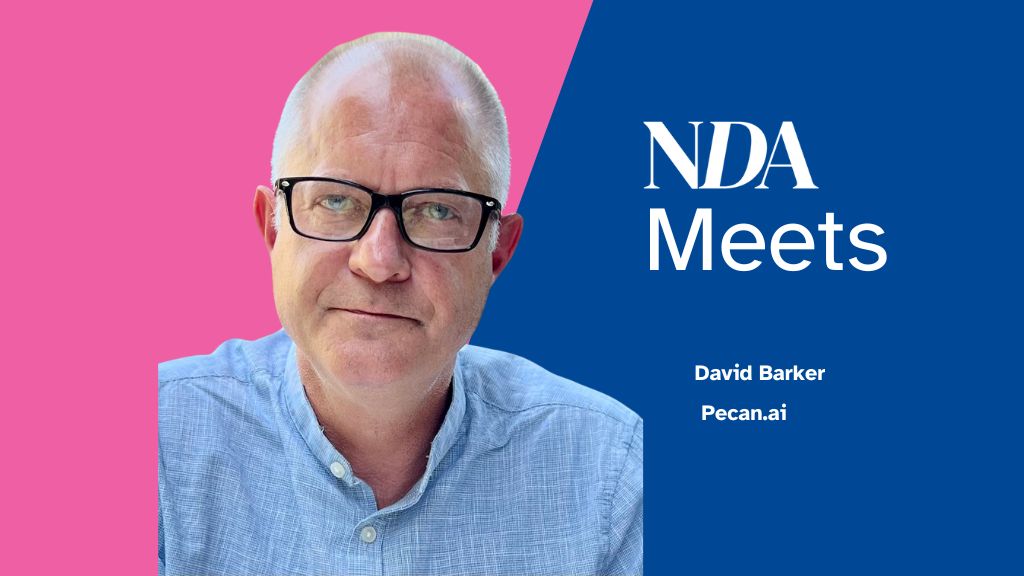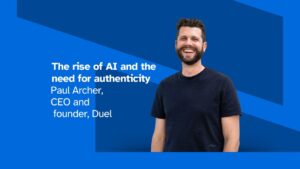Industry veteran David Barker has worked at the cutting edge of marketing tech for most of his career and recently took up a new position with predictive analytics company Pecan.ai.
New Digital Age chatted with Barker about his latest role and his views on how the marketing industry has evolved over his years in business.
Tell me about your latest role and how your career led you here?
My new post is Global Head of Enterprise Sales at Pecan.ai.
Throughout my career, I’ve worked mainly with cutting-edge, nascent technologies. When I first started out my career, I was doing ad sales and I thought, do I want to be selling the same old product to the same old people for the next 30 years? So when the internet first took off, I pivoted and started working for one of the first full service digital agencies in London.
When I would suggest to clients such as the Post Office or ASDA that their website would one day generate more income than one of their physical outlets, they would laugh and say, “Don’t be ridiculous”. In the end, the agency, Hyperlink Plc, was acquired by Cable & Wireless and after the earn out I took a year off sitting on the beach and thinking about what would be the next big thing.
I decided it would be something to do with mobile advertising. I became the EMEA MD of Enpocket when the idea of putting ads on mobile phones seemed ridiculous to many, but look at the size of the mobile ad market today. That business, Enpocket, was sold to Nokia where I stayed for 5 years in various Global roles. From there, I got into programmatic advertising with Amobee which then led me, in turn, to CTV and nearly five years with SambaTV.
Last year, I took a six month break to travel to coincide with my wife’s retirement from the Royal Airforce where she had been an Officer for 20 years. When I was thinking about what I might do next I could see that the world was going crazy for AI. It seemed to me that there were a lot of super smart companies with super smart founders who were developing these AI products but, by their own admission, they didn’t really have any go to market experience. So I established a consulting business called AI-gotomarket, and a variety of AI companies reached out quite quickly for help.
Pecan AI was among the companies that I got to know and I quickly saw that they had a fantastic product, Tier 1 investors such as Google Ventures, global clients such as J&J. and Zohar Bronfman, the Co-Founder and CEO, is super smart, a disruptor, and an all round great leader. He asked me to commit to them full time and I jumped at the chance.
What is Pecan AI’s core proposition?
Our focus is on improving the way that people build out predictive models using AI, and I think we’ve got one hell of a product.
Everyone is talking about Generative AI, but not much attention has been paid to applying AI to predictive modeling, which is super complex and a very sophisticated skill. That’s why companies hire Data Scientists to do it. For example, a company might want to understand what products it should promote to a particular group of customers in order to maximise their chance of a sale.
Pecan has developed a SaaS platform which enables Data Analysts within businesses to create those everyday predictive models, allowing the Data Scientists to concentrate on the super high end stuff. Our software takes a highly complex job that all companies need to do and makes it accessible and manageable for a greater variety of people in the business to handle – data democratisation.
The key thing with any form of AI is you need to establish ways to measure whether it’s improving your business and, if so, how it’s improving your business. That could be creating outputs that cost you far less money than previously, or it could be creating more sales, or speeding up your time to market, It’s like any of the technologies that I’ve sold over the years; when it’s something new, people need to be able to go back to their CFO or CMO, or whoever it might be who’s holding the budget, and say, “We’ve done a test, and we achieved our goals using this tech. Let’s invest more money.” It’s not unique to AI: people need to understand what value they’ll get from using the tech.
What are the big challenges facing digital marketers in 2024?
As recently as 15 years ago, if you looked at TV in the UK, there were a handful of commercial channels to choose from and a few big websites to focus ad budgets on, alongside traditional media. Today, the media landscape is much more complicated and fragmented. If I’m trying to engage someone in the environment of, say, Tiktok, I need to be talking to the people in a way that really appeals to them at that particular time of day in that specific environment. That will be very different to how you might run a connected TV campaign, and so on.
We’re going to see more and more sophisticated technology helping marketers to target their ads in the right place at the right time, and then to judge the effectiveness of those ads. We’re going to see, especially in the ad tech industry, more applications of AI, especially in the area of measurement and predictive analytics. I don’t think that necessarily means that we’re going to lose a load of jobs to AI. It’ll make some people more efficient at what they do, and in other instances, AI will take over the more day-to-day, repetitive, mundane tasks.
As an experienced leader, what are your tips on leading a team?
You’ve always got to remember that your ultimate asset is your people. How you get those people to perform is key to the success of your company. For me, the best way to build an effective, scalable team is to be authentic. A lot of people don’t manage to build enough trust amongst their teams. If you’ve got a team of people that think you’re a good, honest person who’s got their back and you’re prepared to lead from the front, I think you’re halfway there. You need a clear set of company values, or team values, and you need to make sure that everyone’s on board with those, and then you’ve got to stick and adhere to them.
What are your ambitions for the year ahead?
I love being part of the leadership team of a small-to-medium sized business that has cutting edge technology that I think can be applied to a lot of different sectors. I enjoy taking that product, that idea, to market. I’m not the sort of leader that likes to sit behind a desk with a huge team, running Salesforce reports all day. I like to be out on the street, talking to customers, evangelizing emerging technologies.
I genuinely believe that nearly every type of business globally can benefit from the type of products that Pecan AI is creating, and my job is obviously to try to excite them about what AI can do for their companies. That’s what I intend to be doing for the next three to five years.
After that it’s back to some more traveling and trying to predict the next big thing that I can get involved in.









